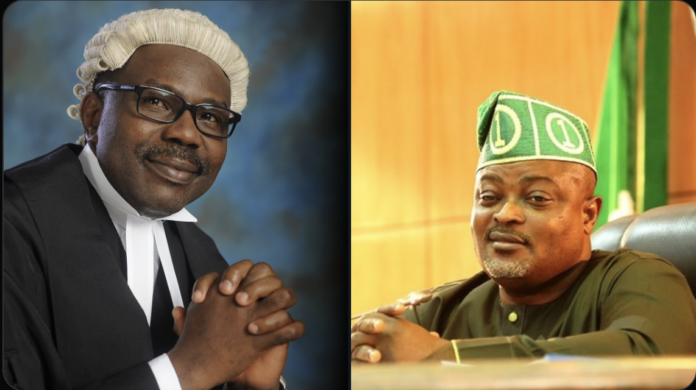The political downfall of Mudashiru Obasa, Speaker of the Lagos State House of Assembly, is imminent, according to Senior Advocate of Nigeria (SAN), Muiz Banire, who claims that the embattled politician’s recent actions have made his removal inevitable. In an exclusive interview with Channels TV’s Hard Copy on Friday, Banire discussed Obasa’s controversial stance on key political issues, which have, in his view, led to his loss of influence and respect within the ruling party and government.
Banire did not mince words, laying bare the reasons behind the Speaker’s waning political clout. According to him, Obasa’s open defiance of the state government and the All Progressives Congress (APC) has escalated the political rift, making his removal from office a matter of when, not if.
“The moment Obasa began taking positions that were in direct contradiction to both the governor and his party, the writing was on the wall,” Banire explained. “His controversial stance on local government autonomy and his opposition to conducting local government elections went against the very principles of the APC and the administration he was supposed to support.”
Banire emphasized that Obasa’s defiance was not just about policy disagreements. His actions, especially his interactions with Governor Babajide Sanwo-Olu, added fuel to the political fire that has already been burning within the corridors of power. A public incident involving Obasa’s rude speech to the governor has only intensified the call for his removal.
“There is a certain level of mutual respect expected in any political setup. Obasa’s behavior towards Governor Sanwo-Olu was unacceptable,” Banire stated. “Delaying the governor for four hours during an official visit is an offense in itself, but his speech – disrespectful and insubordinate – was a breach of the very fabric of party unity. It became a public demonstration of division that the party leaders could not overlook.”
For Banire, the crux of Obasa’s political downfall lies in his failure to acknowledge the repercussions of his actions. Despite the apparent indifference of the governor, key party leaders, including chieftains of the APC, saw Obasa’s actions as a blatant defiance against party unity and discipline.
“Obasa’s public statement gave the impression that there was a major rift within the party, one that had been simmering beneath the surface. Externalizing that fracture was a line that should never have been crossed,” Banire added. “This behavior triggered the inevitable sanctions that are now closing in on him.”
Obasa’s influence, which was largely tied to his position as the Speaker of the House, has now diminished. Banire emphasized that in politics, positions and affiliations are everything. Once the position is gone, so too is the power that comes with it.
“Political loyalty is often tied to positions of power,” Banire said. “Once Obasa is no longer in that office, his support base will erode. People follow money and power. With the loss of that position, his influence will wither away.”
The senior lawyer also drew a sharp contrast between Obasa’s downfall and his role in the removal of previous Assembly leaders. Banire invoked the principle of karma, suggesting that Obasa is now reaping the consequences of the political games he played with others in the past.
“He has been part of orchestrating the removal of other leaders in the Assembly. Now, he is facing the consequences of his own actions,” Banire observed. “In politics, what goes around often comes around. He can’t expect sympathy after being a key player in past political upheavals.”

